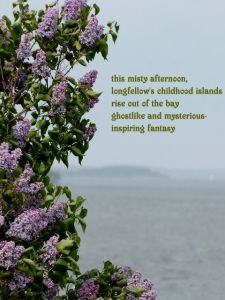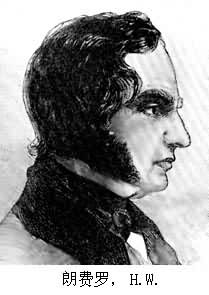My Lost Youth
My Lost Youth
by Henry Wadsworth Longfellow
Often I think of the beautiful town
That is seated by the sea;
Often in thought go up and down
The pleasant streets of that dear old town,
And my youth comes back to me.
And a verse of a Lapland song
Is haunting my memory still:
"A boy's will is the wind's will,
And the thoughts of youth are long, long thoughts."
I can see the shadowy lines of its trees,
And catch, in sudden gleams,
The sheen of the far-surrounding seas,
And islands that were the Hesperides
Of all my boyish dreams.
And the burden of that old song,
It murmurs and whispers still:
"A boy's will is the wind's will,
And the thoughts of youth are long, long thoughts."
I remember the black wharves and the ships,
And the sea-tides tossing free;
And Spanish sailors with bearded lips,
And the beauty and mystery of the ships,
And the magic of the sea.
And the voice of that wayward song
Is singing and saying still:
"A boy's will is the wind's will,
And the thoughts of youth are long, long thoughts."
I remember the bulwarks by the shore,
And the fort upon the hill;
The sunrise gun, with its hollow roar,
The drum-beat repeated o'er and o'er,
And the bugle wild and shrill.
And the music of that old song
Throbs in my memory still:
"A boy's will is the wind's will,
And the thoughts of youth are long, long thoughts."
I remember the sea-fight far away,
How it thundered o'er the tide!
And the dead captains, as they lay
In their graves, o'erlooking the tranquil bay
Where they in battle died.
And the sound of that mournful song
Goes through me with a thrill:
"A boy's will is the wind's will,
And the thoughts of youth are long, long thoughts."
I can see the breezy dome of groves,
The shadows of Deering's Woods;
And the friendships old and the early loves
Come back with a Sabbath sound, as of doves
In quiet neighborhoods.
And the verse of that sweet old song,
It flutters and murmurs still:
"A boy's will is the wind's will,
And the thoughts of youth are long, long thoughts."
I remember the gleams and glooms that dart
Across the school-boy's brain;
The song and the silence in the heart,
That in part are prophecies, and in part
Are longings wild and vain.
And the voice of that fitful song
Sings on, and is never still:
"A boy's will is the wind's will,
And the thoughts of youth are long, long thoughts."
There are things of which I may not speak;
There are dreams that cannot die;
There are thoughts that make the strong heart weak,
And bring a pallor into the cheek,
And a mist before the eye.
And the words of that fatal song
Come over me like a chill:
"A boy's will is the wind's will,
And the thoughts of youth are long, long thoughts."
Strange to me now are the forms I meet
When I visit the dear old town;
But the native air is pure and sweet,
And the trees that o'ershadow each well-known street,
As they balance up and down,
Are singing the beautiful song,
Are sighing and whispering still:
"A boy's will is the wind's will,
And the thoughts of youth are long, long thoughts."
And Deering's Woods are fresh and fair,
And with joy that is almost pain
My heart goes back to wander there,
And among the dreams of the days that were,
I find my lost youth again.
And the strange and beautiful song,
The groves are repeating it still:
"A boy's will is the wind's will,
And the thoughts of youth are long, long thoughts."
逝去的青春
杨德豫 译
那美丽的古城常教我怀想,
它就座落在大海边上;
多少次,我恍惚神游于故乡,
在那些可爱的街衢上来往,
俨然又回到了年少的时光。
一首拉普兰民歌里的诗句
一直在我记忆里回荡:
“孩子的愿望是风的愿望,
青春的遐想是悠长的遐想。”
我望见葱茏的树木成行,
从忽隐忽现的闪闪波光
撇见了远处环抱的海洋;
那些岛,就象是极西仙境,
小时候惹动我多少梦想!
那首古老民歌的迭句
依旧在耳边喃喃低唱:
“孩子的愿望是风的愿望,
青春的遐想是悠长的遐想。”
我记得乌黑的码头和船台,
海上恣意奔腾的潮汐;
满嘴胡须的西班牙水手,
一艘艘船舶的壮丽神奇,
茫茫大海诱人的魔力。
那萦回不去的执拗歌声
仍然在那里又唱又讲:
“孩子的愿望是风的愿望,
青春的遐想是悠长的遐想。”
我记得岸上的防御工事,
记得山头耸立的碉楼;
日出时,大炮隆隆怒吼,
鼙鼓一阵阵雷响不休,
号角激昂锐利的吹奏。
那首民歌的悠扬曲调
依然波动在我的心头:
“孩子的愿望是风的愿望,
青春的遐想是悠长的遐想。”
我记得那次远处的海战,
炮声在滚滚浪潮上震荡;
两位船长,在墓中安躺,
俯临着寂廖宁静的海湾--
那就是他们战死的沙场。
那哀怨的歌声往复回翔,
颤栗的音波流过我心房:
“孩子的愿望是风的愿望,
青春的遐想是悠长的遐想。”
我看见微风里林木亭亭,
荻岭森林洒布着阴影;
旧日的友谊,早年的恋情
以安舒的音调回到我心里,
宛如幽静邻里的鸽鸣。
那古老民歌的甜美诗句
依稀在低语,在颤动不停:
“孩子的愿望是风的愿望,
青春的遐想是悠长的遐想。”
我记得缕缕的亮光和暗影
翩翩掠过我童稚的心灵;
心底蕴藏的歌声和静默
有几分是预言,还有几分
是狂热而又虚幻的憧憬。
听啊,那起伏不定的歌声
还在唱着,总也不平静:
“孩子的愿望是风的愿望,
青春的遐想是悠长的遐想。”
有一些梦境永不会泯灭;
有一些情景我不能倾诉;
有一些愁思,使心灵疲弱,
使脸色苍白--象白蜡新涂,
使眼睛湿润--象蒙上潮雾。
那句不详的歌词好象
一个寒颤落到我身上:
“孩子的愿望是风的愿望,
青春的遐想是悠长的遐想。”
当我重临这亲爱的古城,
眼中的景象已这般陌生;
但故乡的空气甘美而纯净,
熟识的街衢洒满了树影,
树枝上下摆动个不停,
都在唱着那动人的歌声,
在低声叹息,在曼声吟咏:
“孩子的愿望是风的愿望,
青春的遐想是悠长的遐想。”
怀着近似痛苦的欢欣,
我的心魂象故国飞奔;
荻岭森林秀丽而鲜润;
从一一重温的缤纷旧梦里,
我又觅回了逝去的青春。
树丛还在反复的吟唱
那奇异而又美妙的诗行:
“孩子的愿望是风的愿望,
青春的遐想是悠长的遐想。”
1849年,已人到中年的诗人丧失了父亲,次年又失去了兄长,1851年母亲离世。1854年他辞去教授职位,专事文学创作。1846年诗人曾经重回故里,后来回忆说他曾漫步于曼乔伊山(munjoy’s hill),徜徉于海边的劳伦斯堡垒(fort lawrence),他匍匐在一个射击孔上,聆听着脚下波涛轻轻拍打着海岸的声音。在这风和日丽的下午,港湾里片片白帆来往穿梭。诗人沉浸在这座古堡里,有意要把故乡写进诗里,因无人曾经写过,但是这愿望直到1855年3月29日在剑桥镇的家中才实现。他在日记中写到“一天的辛劳,围在火旁;入夜后,当我躺在床上,一首记忆中的波特兰—我的故乡—一座美丽的海滨城市的诗涌现于脑际。”诗中48岁的诗人回忆了波特兰和在那里度过的少年时光,往事历历在目,梦萦魂绕的故乡旧时情景跃然纸上,诗人渴望自由与充满幻想的青春在脑际回荡。在青少年时代的梦想和愿望中找到了逝去的青春。该诗最早发表于1855年8月的《匍南月刊》(putnam’s monthly magazine)第六期,后来又收录并重发表于《迈尔斯•斯坦狄什的求婚》(the courtship of miles standish, 1858)。
全诗共有十节,每节有九行,诗歌押韵工整,韵式为abaabcdde,充满了乐感,读来朗朗上口;每节诗以一首拉普兰歌曲中的副歌结尾“少年的愿望就是风的愿望,青春的遐想是悠长的遐想”,更突出强调了青少年时代的诗人对生活和未来充满憧憬与幻想、渴望无拘无束、毫无羁绊的自由。正如他所说的那样,诗歌的目的就是要给人以快感和美感,要创造一个超越现实生活的理想世界。
亨利•华兹华斯•朗费罗 (Henry Wadsworth Longfellow 1807-1882)
美国著名诗人。1807年2月27日出生於缅因州波特兰城一个律师家庭。1822年进入博多因学院, 与霍桑是同班同学。毕业后去过法国、西班牙、意大利和德国等地, 研究这些国家的语言和文学。1836年开始在哈佛大学讲授语言、文学, 致力於介绍欧洲文化和浪漫主义作家的作品, 成为新英格兰文化中心剑桥文学界和社交界的重要人物。1839年出版第一部诗集《夜吟》, 包括著名的《夜的赞歌》、《生命颂》、《群星之光》等音韵优美的抒情诗。1841年出版诗集《歌谣及其他》, 其中有故事诗《铠甲骷髅》、《金星号遇难》, 也有叙事中含有简朴哲理的《乡村铁匠》、《向更高处攀登》等。诗中充溢了淬质奋发的精神和乐观情绪。這两部诗集在大西洋两岸风靡一时, 他从此以诗人闻名于世。朗费罗于1845年发表诗集《布吕赫钟楼及其他》, 因收有《斯普林菲尔德的军火库》、《桥》、《努伦堡》和《布吕赫钟楼》等佳篇而为人称道。《海边与炉边》(1849)包含了诗人向读者宣告创作意图的《献辞》以及通过造船的形象讴歌联邦的缔造的长诗《航船的建造》。
朗费罗的主要诗作包括3首长篇叙事诗, 或"通俗史诗": 《伊凡吉林》(1847)、《海华沙之歌》和《迈尔斯•斯坦狄什的求婚》(1858)。1854年辞去哈佛大学教职, 专事创作。次年发表《海华沙之歌》。這是采用印第安人传说而精心构思的长诗, 写印第安人领袖海华沙一生克敌制胜的英雄业绩, 以及他结束部落混战, 教人民种植玉米, 清理河道, 消除疾病等重要贡献。在美国文学史上這是描写印第安人的第一部史诗, 但诗的素材主要來源於斯库尔克拉夫特的著作, 作者缺乏直接的生活体验; 诗的韵律完全模仿芬兰史诗《卡勒瓦拉》, 当时虽然受到了读者的赞赏, 却遭到后代一些评论家的责难。从1843年起, 朗费罗夫妇在幽静的克雷吉别墅中度过了17年幸福的家庭生活。1861年他的夫人不幸被火烧伤致死, 這一直使他无比悲痛。为了摆脱精神上的重负, 他投身於但丁的《神曲》的翻译, 还写了6首关於但丁的十四行诗, 是他最佳的诗作。《路畔旅舍的故事》(1863)大体上仿效乔叟的《坎特伯雷故事集》。以《基督》命名的三部曲诗剧於1872年完成。
朗费罗晚年创作不辕, 备受尊祟, 牛律大学和剑桥大学曾分别授予他荣誉博士学位。他75岁生日那一天, 美国各地的学校都举行了庆祝。1882年3月24日朗费罗逝世。伦敦威斯敏斯特教堂诗人之角安放了他的胸像, 他是获得這种尊荣的第一位美国诗人。
朗费罗一生创作了大量的抒情诗、歌谣、叙事诗和诗剧。他的诗歌在美国广为传诵, 在欧洲受到赞赏, 被译成20余种文字; 20世纪以來, 他的诗名急剧下降, 其地位变化之大, 在美国文学史上也是罕见的。
附件列表
词条内容仅供参考,如果您需要解决具体问题
(尤其在法律、医学等领域),建议您咨询相关领域专业人士。
如果您认为本词条还有待完善,请 编辑



